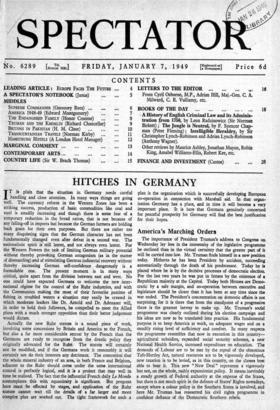HITCHES IN GERMANY
IT is plain that the situation in Germany needs careful
handling and close attention. In many ways things are going well. The currency reform in the Western Zones has been a striking success, production of basic commodities like coal and steel is steadily increasing and though there is some fear of a temporary reduction in the bread ration, that is not because of any falling-off in imports but because the German farmers are holding back grain for their own purposes. But there are rather too many disquieting signs that the German character has not been fundamentally changed even after defeat in -e second war. The nationalistic spirit is still latent, and not always even latent. For the Western Powers the task of limiting German military potential without thereby provoking German antagonism (as in the matter of dismantling) and of stimulating German industrial recovery without thereby increasing German self-confidence dangerously is a formidable one. The present moment is in many ways critical, quite apart from the division between east and west. No one could have expected Germans to welcome the new inter- national regime for the control of the Ruhr industries, and with the Communists making the most of their favourite pastime of fishing in troubled waters a situation may easily be created in which moderate leaders like Dr. Arnold and Dr. Adenauer will, in order to hold their followers, be compelled to meet the Allied plans with a much stronger opposition than their better judgement would dictate.
Actually the new Ruhr statute is a sound piece of work, involving some concessions by Britain and America to the French, but also a far more considerable retreat by the French than the Germans are ready to recognise from the drastic policy they originally advocated for the Ruhr. The statute will certainly not be modified, and if the Germans work it reasonably it will certainly not do their interests any detriment. The contention that the whole mineral industry of an area, in both France and Belgium, adjacent to the Ruhr should come under the same international control is perfectly logical, and it is a project that may well in time be realised. The fact that the influential French daily Le Monde contemplates this with equanimity is significant. But progress here must be effected by stages, and application of the Ruhr statute cannot wait till the details of a far larger and more complex plan are worked out. The right framework for such a plan is the organisation which is successfully developing European co-operation in connection with Marshall aid. In that organ- isation Germany has a place, and in time it will become a very important place. It is here that Germans genuinely concerned for peaceful prosperity for Germany will find the best justification for their hopes.






































 Previous page
Previous page